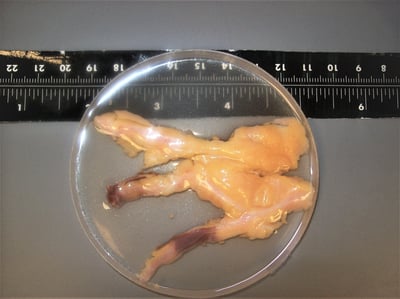Coronary Arteries
The coronary arteries supply blood to the myocardium of the heart and are a key consideration in cardiovascular safety assessment; even small drug-mediated changes in the vascular tone of coronary arteries could increase the risk of angina or myocardial infarction. We are able to assess the potential for drug-mediated effects on human isolated coronary arteries and provide comparisons to coronary arteries from commonly used preclinical species. A few key advantages of our coronary artery model:
- Both IC50 and pA2 values can be determined
- Customized protocols and options to conduct studies to GLP
- A variety of reference compounds available on request (angiotensin II, 8-arginine vasopressin, mephedrone, 5-HT)
- Organ bath or wire myograph studies are possible

Image: Isolated coronary arteries in a Petri dish.
This model uses coronary arteries to assess the effect of your test article on vasoconstriction via angiotensin receptors or in comparison to AT1 receptor agonists.
This model uses coronary arteries to assess the effect of your test article on vasoconstriction via angiotensin receptors or in comparison to AT1 receptor agonists.
This model assesses the effect of your test article on vasoconstriction via 5-HT (serotonin) receptors in comparison to sumatriptan.
This model assesses the effect of your test article on vasoconstriction of denuded arteries via 5-HT (serotonin) receptors in comparison to 5-HT.
This model uses coronary arteries to assess the effect of your test article on vasoconstriction via vasopressin and oxytocin receptors.